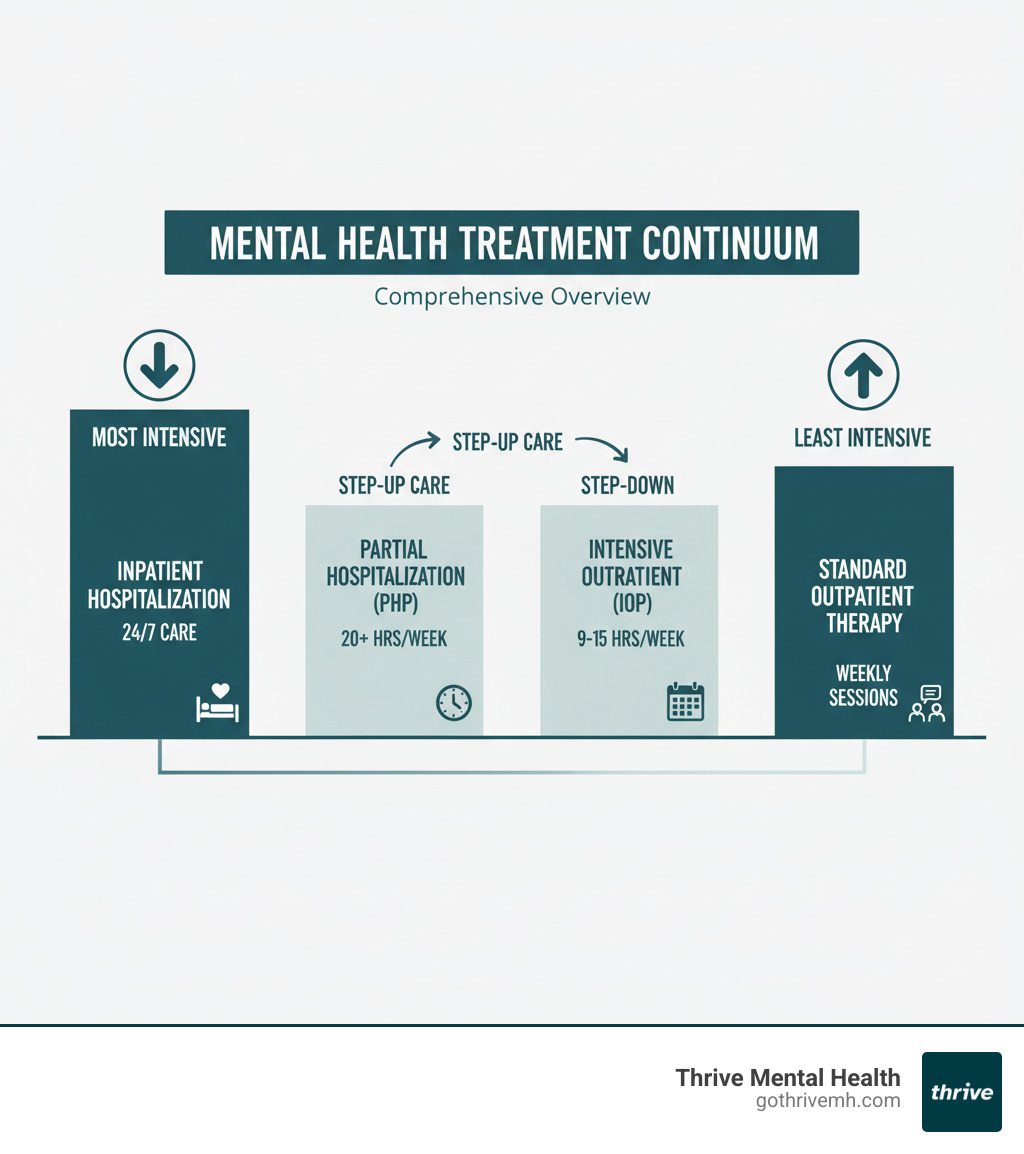Outpatient Treatment Explained: Is IOP Right for You?

IOP Treatment: 2025 Flexible Support You Deserve
IOP Treatment [2025]: Stabilize Symptoms in 9–12 Weeks Without Pausing Work
If you’re in crisis, call/text 988 right now. You are not alone.
When you’re struggling with anxiety or depression, iop treatment (Intensive Outpatient Program) offers a structured path to recovery without putting your life on hold.
Quick Answer: What is IOP Treatment?
- Definition: Structured mental health care requiring 9-15 hours per week
- Format: Group therapy, individual sessions, and skill-building workshops
- Schedule: Flexible timing (morning or evening) to fit work/school
- Duration: Typically 9-12 weeks
- Best for: Those needing more than weekly therapy but not 24/7 care
- Conditions treated: Depression, anxiety, PTSD, substance use, bipolar disorder, OCD
If you’re feeling overwhelmed by mental health symptoms, you’re not alone. IOPs are a prevalent and effective form of care in the U.S., serving over 140,000 patients annually.
Studies show IOPs produce outcomes comparable to inpatient care but with the flexibility to maintain your job and daily life. You get intensive, evidence-based therapy without the disruption of residential treatment.
I’m Anna Green, LMHC, LPC, founder of Thrive Mental Health. I’ve dedicated my career to making high-quality, virtual-first iop treatment accessible. I’ve seen how the right IOP transforms lives by fitting into the realities of modern living.

Iop treatment helpful reading:
What is an Intensive Outpatient Program (IOP)?
Iop treatment is the sweet spot in mental health care: intensive enough for real change, yet flexible enough for your life. It provides structured support while you live at home, work, and maintain relationships.
Iop treatment fills a crucial gap. It’s for when weekly therapy isn’t enough, but residential care is too much. It’s also for when you’re stepping down from a more intensive program but aren’t ready to go it alone.
IOPs work as both step-down and step-up care. If you’re transitioning from inpatient or a Partial Hospitalization Program (PHP), an IOP provides an essential bridge back to everyday life. You practice new coping skills in real-world situations with a strong safety net.
If weekly therapy isn’t enough, iop treatment is the step-up you need to accelerate progress.
IOPs respect your life. You maintain routines and responsibilities while receiving care. This is clinically smart, as you practice new skills in your real-world environment.
Here’s how different levels of care stack up:
| Feature | Inpatient Treatment | PHP | IOP | Standard Outpatient |
|---|---|---|---|---|
| Time Commitment | 24/7 care | 20+ hours/week | 9-15 hours/week | 1-2 hours/week |
| Where You Live | Treatment facility | Home | Home | Home |
| Schedule Flexibility | None | Limited | High | Very high |
| Clinical Support | Constant | Daily | 3-5 days/week | Weekly |
| Real-world Practice | None | Some | Extensive | Extensive |
The structured flexibility of iop treatment allows for morning or evening sessions to fit your schedule. For a detailed breakdown, check our guide on IOP vs PHP. Explore our virtual IOP options that bring expert treatment to you.
The goal isn’t to pause your life for treatment—it’s to give you the tools to live it better.
What Conditions Does IOP Treatment Help?

Iop treatment is versatile, offering structured support for a range of challenges while you maintain your daily routine.
- Depression: Our IOPs help you understand its patterns, develop coping strategies, and manage medication. We focus on building sustainable tools for long-term wellness.
- Anxiety disorders: We teach you to recognize triggers, manage symptoms, and face fears in a supportive environment.
- PTSD and trauma: iop treatment provides a safe space to process experiences and reclaim your sense of safety and control.
- Substance Use Disorders: IOPs are highly effective for SUDs. Studies show substantial reductions in substance use, as you practice sobriety while maintaining daily responsibilities.
- Dual Diagnosis: We treat co-occurring mental health and substance use challenges as interconnected parts of your wellness.
- Bipolar and other mood disorders: These benefit from the consistent support and medication oversight in IOPs, making mood swings more manageable.
- Obsessive-Compulsive Disorder (OCD): OCD responds well to specialized therapies like Exposure and Response Prevention, which we incorporate into our IOP structure.
- Other Conditions: We also effectively treat personality disorders, eating disorders, and provide support for serious persistent mental illnesses. Our programs are neurodivergence-affirming, recognizing the unique needs of individuals with ADHD, autism, and other conditions.
If you’re in crisis, call/text 988 right now. You are not alone.
A Look Inside an IOP: Therapies, Schedule, and Duration

Struggling with anxiety at work but can’t commit to residential treatment? Iop treatment bridges that gap, offering intensive healing without pausing your life.
Our iop treatment plans are not cookie-cutter; they are built around your specific challenges and goals. A typical day blends healing activities like mindfulness, group therapy, and individual work. It’s structured for change but flexible for your life.
For a complete picture, our guide on what to expect in an IOP walks you through every detail.
What Therapies Are Used in an IOP?
We use a variety of evidence-based therapies because healing isn’t one-size-fits-all.
- Group therapy is the heart of most IOPs. Connecting with peers provides support, shared learning, and a safe space to practice new skills.
- Individual therapy provides a deep dive into your personal story, tackling specific challenges and goals with your therapist.
- Family therapy can be a game-changer, improving communication and support within the family system.
- Evidence-Based Modalities: We integrate proven approaches like Cognitive Behavioral Therapy (CBT) to manage negative thoughts and Dialectical Behavior Therapy (DBT) to regulate emotions. For trauma, Eye Movement Desensitization and Reprocessing (EMDR) helps process painful memories, while Acceptance and Commitment Therapy (ACT) teaches you to move toward your values.
- Other Therapies: We also use Motivational Interviewing, medication management, skill-building workshops, and 12-Step facilitation to provide comprehensive support.
What is a Typical IOP Treatment Schedule?
The ‘intensive’ part of iop treatment refers to the time commitment: 9-15 hours per week, typically in three-hour sessions a few days a week.
The key is flexibility. We offer morning, evening, and virtual programs to fit your schedule. Our virtual iop treatment is revolutionary, allowing you to attend sessions from anywhere with an internet connection. While demanding, this intensive approach accelerates progress far more than weekly therapy.
How Long Does IOP Treatment Last?
The duration of iop treatment depends on your unique journey. Most programs last 9-12 weeks, but your timeline is based on progress, not a calendar.
Your therapist will help you recognize clinical milestones to determine when you’re ready to step down to a lower level of care. Nearing completion, we focus on step-down planning to ensure you have robust aftercare support, which may include weekly therapy or support groups. Finishing an IOP means moving to a sustainable level of support. The skills you learn are tools for life.
Is an IOP Right for You? Candidacy, Cost, and Effectiveness

Deciding on mental health treatment is overwhelming. Is iop treatment worth the time? Will insurance cover it? Is it effective? Let’s walk through these questions to help you decide.
Who is the Ideal Candidate for an IOP?
Iop treatment works best for those who need more than weekly therapy but don’t require 24/7 supervision. You’re likely a good fit if you:
- Have a stable living environment.
- Are motivated for change and ready for active participation.
- Are not an immediate danger to yourself or others.
- Are stepping down from inpatient/PHP care or stepping up from weekly therapy.
- Have a strong support system or are willing to build one.
- Need to maintain daily responsibilities like work, school, or family care.
The Benefits of IOP Treatment
- Real-World Integration: You practice new coping skills in your actual environment, which helps them stick.
- Flexibility: Morning and evening programs allow you to get help without pausing your life.
- Affordability: IOPs cost significantly less than inpatient care while still providing comprehensive services.
- Peer Support: Group therapy creates lasting connections with others who understand your struggles.
- Reduced Stigma: Receiving treatment while living at home can feel less daunting than residential care.
For more details, explore our article on the benefits of an Intensive Outpatient Program.
Does Insurance Cover IOP?
Yes, most insurance plans cover iop treatment because it’s effective and cost-efficient.
- Medicare Part B covers IOP services in appropriate settings. Learn more about Medicare Part B coverage for IOP.
- Private insurance companies like Cigna, Aetna, UnitedHealthcare/Optum, and Florida Blue typically offer coverage. Your out-of-pocket costs depend on your specific plan.
- In Florida, where we operate, many plans provide comprehensive coverage for our IOPs, including virtual options.
- Medicaid also covers IOP services in many states.
We make it easy to check your insurance coverage so there are no surprises.
How Effective is IOP Treatment?
Iop treatment is genuinely effective, with outcomes that rival more intensive levels of care.
Research shows IOP outcomes are comparable to inpatient care for mental health and substance use disorders, leading to substantial reductions in substance use and improved symptoms. Many programs report that over 90% of clients see improvements.
Effectiveness is about long-term recovery. By teaching practical skills in a real-world context, IOPs create a foundation for sustained wellness. They work because they provide the intensity needed for change while allowing you to continue living your life.
How to Find an IOP Program Near You
Finding the right iop treatment program doesn’t have to be overwhelming. Like finding a therapist, you want a good fit. Today, there are more quality options than ever.
- Start with trusted sources. Your doctor or current therapist can provide referrals and help determine if an IOP is the right level of care for you.
- Check with your insurance company. Call the number on your card to get a list of in-network IOPs and ask about your specific benefits to avoid surprise costs.
- Use online searches. Look for “intensive outpatient program” plus your city. You’ll find websites and reviews to compare options, but don’t limit your search geographically.
- Consider virtual IOP programs. They are a game-changer for those in rural areas, with transportation issues, or who prefer care from home, offering greater access and flexibility.
- Ask key questions when evaluating programs. Does it specialize in your condition? What’s the weekly schedule? Are therapists licensed? What aftercare support is provided?
- Consider the practicals. Can you get to the location? Do the times work? For virtual programs, do you have reliable internet and a private space?
For a deeper dive, our guide on finding a quality IOP walks you through the process. The best program is the one that meets your specific needs and fits your life.
IOP Treatment FAQs [People Also Ask]
What is IOP treatment and how many hours is it?
IOP treatment is intensive outpatient care: 9–15 hours per week over 3–5 days, typically for 9–12 weeks. It blends group therapy, individual sessions, and psychiatry. Learn more: What to expect in an IOP.
Can I work or go to school during an IOP?
Yes. Most programs offer morning/evening tracks and virtual options so you can keep your routine. Explore our virtual IOP.
How much does IOP cost with insurance?
Coverage is common with Cigna, Optum/UnitedHealthcare, Aetna, Florida Blue, Medicare, and Medicaid in Florida. Your cost depends on copays/coinsurance and deductibles. Check your benefits in 2 minutes: Verify insurance.
Who should choose IOP vs. PHP or inpatient?
Choose IOP if you need more than weekly therapy, have stable housing, and aren’t an immediate safety risk. PHP is 20+ hours/week if you need more structure. Inpatient is best for 24/7 safety needs. Compare levels: IOP vs PHP.
Is virtual IOP as effective as in-person?
Yes—when delivered by licensed clinicians with evidence-based care, outcomes are comparable. Virtual IOP expands access statewide in Florida, keeping you connected at home.
Suggested JSON-LD FAQ schema markup:
{
“@context”: “https://schema.org”,
“@type”: “FAQPage”,
“mainEntity”: [
{
“@type”: “Question”,
“name”: “What is IOP treatment and how many hours is it?”,
“acceptedAnswer”: {
“@type”: “Answer”,
“text”: “IOP is intensive outpatient care: 9–15 hours per week over 3–5 days, for about 9–12 weeks. It includes group, individual therapy, and psychiatry.”
}
},
{
“@type”: “Question”,
“name”: “Can I work or go to school during an IOP?”,
“acceptedAnswer”: {
“@type”: “Answer”,
“text”: “Yes. Morning/evening tracks and virtual options let you keep work or school while attending.”
}
},
{
“@type”: “Question”,
“name”: “How much does IOP cost with insurance?”,
“acceptedAnswer”: {
“@type”: “Answer”,
“text”: “Many plans (Cigna, Optum/UnitedHealthcare, Aetna, Florida Blue, Medicare, Medicaid) cover IOP. Your cost depends on copay/coinsurance and deductible.”
}
},
{
“@type”: “Question”,
“name”: “Who should choose IOP vs. PHP or inpatient?”,
“acceptedAnswer”: {
“@type”: “Answer”,
“text”: “Choose IOP if you need more than weekly therapy, have stable housing, and are not an immediate safety risk. PHP is more intensive (20+ hours/week); inpatient is for 24/7 safety.”
}
},
{
“@type”: “Question”,
“name”: “Is virtual IOP as effective as in-person?”,
“acceptedAnswer”: {
“@type”: “Answer”,
“text”: “Yes. When delivered by licensed clinicians with evidence-based care, virtual and in-person outcomes are comparable.”
}
}
]
}
Get the Flexible, Intensive Support You Deserve
Your mental health journey shouldn’t require pausing your life. Iop treatment is a powerful middle ground: intensive enough for real change, yet flexible enough for your responsibilities.
This guide showed how IOPs bridge the gap between weekly therapy and residential care. With evidence-based therapies and manageable schedules, you can heal while living your life. The power of iop treatment is its real-world approach. You learn to thrive in your daily environment, applying new skills to your actual life, work, and relationships.
Ready for support? Thrive offers virtual and hybrid IOP/PHP with evening options. Verify your insurance in 2 minutes (no obligation) → Start benefits check or call 561-203-6085. If you’re in crisis, call/text 988.